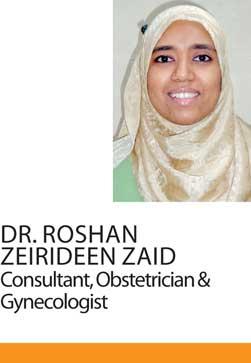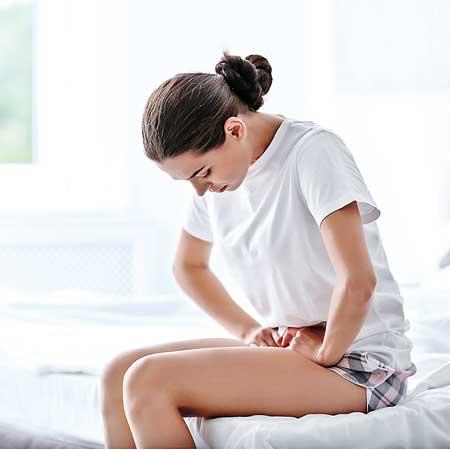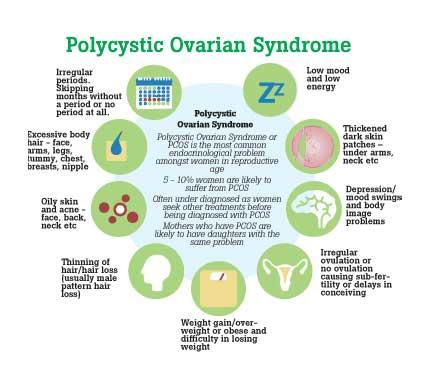21 Jun 2019 - {{hitsCtrl.values.hits}}
 Polycystic Ovarian Syndrome (PCOS) doesn’t mean that there are ‘cysts’ in the ovary. Unfortunately women make requests to get their ‘Cysts” removed due to its name. The name is a misnomer; they are not cysts, but small immature follicles. To enlighten you on the topic we contacted Dr. Roshan Zeirideen Zaid, Consultant, Obstetrician & Gynecologist at Lanka Hospitals, Narahenpita.
Polycystic Ovarian Syndrome (PCOS) doesn’t mean that there are ‘cysts’ in the ovary. Unfortunately women make requests to get their ‘Cysts” removed due to its name. The name is a misnomer; they are not cysts, but small immature follicles. To enlighten you on the topic we contacted Dr. Roshan Zeirideen Zaid, Consultant, Obstetrician & Gynecologist at Lanka Hospitals, Narahenpita.
PCOS is essentially a syndrome of hormonal imbalances. PCOS is the commonest endocrinological problem among women during reproductive age. 5-10% of women suffer from PCOS. But the incidence can vary due the diagnostic criteria that are followed. Never the less it’s still a silent syndrome under diagnosed since women visit various specialties before they get diagnosed with PCOS.
The following criteria are used for the diagnosis: 2 out of 3 should be present for the diagnosis of PCOS:
1) Menstrual irregularities- irregular periods or no periods
2) ‘Polycystic’ looking ovaries on ultrasound (like ‘string of pearls’). These ovaries are slightly larger, but perfectly normal ovaries.
3) Increase in male hormone levels in blood or features due to that- eg: excessive facial and body hair, acne/pimples, hair loss etc.
PCOS does run in the family. There is no specific gene identified for the problem. Mothers who have PCOS are likely to have daughters with the same problem. Also the prevalence and presentations differ due to ethnicity as well. Asian PCOS women are slimmer than the Caucasian PCOS women, but they have increase insulin resistance.

I have seen quite a number of young girls and middle-aged women who are having irregular periods for years. They have been seen by many doctors and had ‘quick fixes’ for their problem; mostly- ieno periods. No one had a diagnosis for her problem. I think it’s vital that one needs to have a diagnosis before commencing treatment.
Diagnostic criteria are as I discussed previously. The symptoms and signs are wide and the presentations fall into various levels of this spectrum of symptoms and signs. For example some women can have regular periods, but with excessive facial hair and PCO looking ovaries on scan only, some can have irregular periods and no hair issue at all.
Irregular/ no pattern in periods. Skipping months without a period or no period at all.
Excessive body hair - face, arms, legs, tummy, chest, breasts, nipple
Oily skin and acne - face, back, neck etc
Thinning of hair/hair loss (usually male pattern hair loss)
Weight gain/overweight or obese and difficulty in losing weight
Irregular ovulation or no ovulation causing sub-fertility or delays in falling pregnant
Depression/ mood swings and body image problems
Less common signs and symptoms include:
Thickened dark skin patches – under arms, neck etc
Low mood and low energy,
Sleep apnea etc. related to weight issues
These issues can ruin the life of a teenager because of not being able to wear what she wants, feeling embarrassed about the unwanted hair sticking out and its impact on physical and mental health. Women trying to conceive not having periods and weight issues play havoc in relationships as well. Usually women present with one or more of the above symptoms or signs.

PCOS is a ‘common’ yet, not so common disorder.
This disorder of hormonal imbalances not only has short term problems, but also long term consequences on a women’s health. The long-term consequences of PCOS depend on these hormones and they are amplified by genetic predispositions and lifestyle. Women are prone to develop an array of metabolic syndromes, like diabetes, cardiovascular diseases, blood pressure, dyslipidemia, fatty liver and cancers due to PCOS. I think it’s important to understand and know the long-term consequences so one can make the effort to prevent them or identify them early.
Women who struggle with being overweight and obese during their lives could have weight related physical and mental health issues. Specially sleep apnea (pausing of breathing during sleep) and snoring. Due to lack of sleep they can have day time drowsiness and lethargy. The impact of weight on the bones and joints causes joint issues. Women suffer with depression due to body weight and other features like excessive hair, stress and other chronic mental health issues.
Insulin (blood sugar maintaining hormone) is one of the hormones involved in PCOS. Insulin resistance is known in women with PCOS. Hence around 1:10 women with PCOS have a higher possibility of getting type 2 diabetes in later life (over 40s) and also gestational diabetes in pregnancy. These women are prone to develop heart, blood pressure and lipid problems later. All these risks are increased if there is a family history of the above, the patient is obese and leads a sedentary lifestyle.
Women who have PCOS can have long spells of no periods/amenorrhea. Due to thickening of the endometrium (inner lining of womb) without being shed there is an increased risk of womb/endometrial cancer in some women. To prevent this risk women should aim to have a period (natural or induced) every three or four months ie 3/4 periods per year. Also some conflicting evidence suggests a slightly high risk of developing ovarian and breast cancer as well. Possible contributing factors associated with the above are hyperandrogenism, nulliparity, obesity and fertility treatments.
Due to irregularities of periods and no ovulation (anovulation) there could be delays in falling pregnant. Ovulation induction and other methods of treatment are available to overcome this issue.
Some women do struggle with acne, hair loss and excessive body and facial hair for a long time as well.
PCOS is indeed a disease with a long history, but yet to this day we still don’t know the etiology of it. The father of medicine had this to say about PCOS.
Hippocrates (460 BC-377 BC) said, “But those women whose menstruation is less than three days or is meagre, are robust, with a healthy complexion and a masculine appearance; yet they are not concerned about bearing children nor do they become pregnant.”
There is no one cure for PCOS, but there are many avenues to deal with its short and long-term consequences.
Since women can present with a wide range of problems the treatment has to be tailor-made and individualized. Eg excessive facial hair/ hair fall/acne/ period issues/ obesity/ sub-fertility etc. Women can have just one or two symptoms or more in combination. There is no one treatment for all. As you can imagine many treatments are available depending on the problem.
One thing that is vital for all women with PCOS is maintaining a healthy body weight or weight reduction.
This will help in getting the periods in women with no periods or to regularize in women who have irregular periods.

Reducing body hair and acne.
Increase ovulation and pregnancy
Reduces the chance of developing high blood pressure, diabetes, dislipidaemia and also endometrial (womb) cancer.
Improves self-esteem and self-confidence.
Diagnosing this condition is very important to prevent the possible long-term consequences, ie cardiovascular disease, diabetes etc. Women who have PCOS should be motivated to maintain a healthy weight, balanced diet and a reasonable number of menstrual cycles.
PCOS is an ancient disease of the modern women, but we still don’t have a definite cure for it. The approach to manage PCOS has to be holistic, women should be made aware of the possible consequences of PCOS so they can maintain a lifestyle that suites their hormonal condition for life. It has to be a whole body and mind approach which could involve some medications, lifestyle modifications, diet and exercise.
22 Dec 2024 1 hours ago
22 Dec 2024 1 hours ago
22 Dec 2024 4 hours ago
22 Dec 2024 4 hours ago
21 Dec 2024 21 Dec 2024